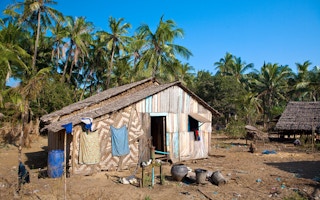WASHINGTON, DC – Millions of the world’s poorest people face serious water-related challenges – from lack of access and shortages to disputes over supplies – with profound implications for security, economic development, and environmental sustainability. As world leaders design a development agenda to succeed the Millennium Development Goals (MDGs), which expire in 2015, addressing these issues should be a top priority.
Consider this: Almost one billion people worldwide lack access to safe drinking water, and 2.5 billion people lack adequate sanitation. The costs are staggering: thousands of child deaths every day, and annual economic losses estimated at $260 billion – more than double the total amount of official development assistance.
Making matters worse, climate change will render water supplies more unpredictable, with increasingly frequent and intense floods and droughts imposing significant human and economic costs and impeding development in poor countries. And the expanding global population – set to reach more than 9.5 billion by 2050 – will strain water resources still further.
Urgent action is needed to ensure access to safe, affordable water and sanitation for all. First, drastic improvements in water-related services – including supply and sanitation, irrigation and drainage, energy, and environmental facilities – are needed to improve health outcomes and enable more people to escape poverty.
“
Public officials can use mobile applications to tag and respond to citizen complaints about the delivery of water and sanitation services, thereby enhancing transparency and accountability
Governments should take the lead in ensuring careful management and sustainable use of scarce water resources. Water-intensive food and energy production – among others – are dependent on uninterrupted supplies. In order to set clear targets for managing water scarcity, reliable, timely data are needed to understand variations in the quality and quantity of water caused by climate change and environmental degradation, as well as to identify patterns of water consumption by households, farmers, and industry.
Addressing these water-related challenges requires heightened efforts in four areas. For starters, new and emerging technologies can be leveraged to design more cost-effective solutions at scale. Today, there are more Internet-connected mobile devices than human beings, providing an extensive network to create and deliver mobile-based solutions.
For example, public officials can use mobile applications to tag and respond to citizen complaints about the delivery of water and sanitation services, thereby enhancing transparency and accountability. In Liberia, data collectors on motorbikes used mobile phones to map 10,000 previously unknown water points – an initiative that informed the country’s first water investment plan, launched last year.
Second, in order to expand services to the poor without over-burdening already-strained public budgets, policymakers should pursue innovative new partnerships with private-sector actors. Of course, this requires effective regulation to protect consumers, together with strong governance structures to ensure that services can recover costs (and thus that they will be delivered consistently and at a high standard over the long term). For example, Kenya, in a bid to attract private investors, has provided shadow credit ratings of 43 utilities.
A significant opportunity exists for private actors to invest in providing affordable water-related services to poor and underserved segments of developing-country populations, owing to enormous untapped demand. In Bangladesh, Indonesia, Peru, and Tanzania, the market for improved on-site sanitation services is estimated to be worth $2.6 billion.
Indeed, sanitation is the third area demanding greater attention. A vast share of the world’s population lacks access to adequate facilities for human-waste disposal. Local programs aimed at changing communities’ behavior could contribute to a cleaner environment and better health outcomes.
As the MDGs demonstrate, development objectives require a strong implementation framework, including sufficient financing and high-quality data, in order to scale up initiatives quickly while establishing accountability and ensuring sustainability. Here, national-level political leadership is critical.
Finally, world leaders must recognize that it will be impossible to address the water challenge effectively without confronting the climate challenge. This demands a concerted effort to take advantage of opportunities for achieving sustainable growth, including by ensuring adequate investment.
Of course, there is also much to be done outside the water and sanitation sectors. In areas like agriculture, energy, forestry, and municipal planning, decisions are taken daily without regard for their implications for water availability and sustainability – a situation that becomes even more complicated when water resources cross national boundaries.
In this context, more integrated, cooperative approaches are needed to improve water management. But negotiations for water-cooperation agreements are fraught with perceived risks associated with issues related to accountability, sovereignty, equity, and stability. Policymakers can mitigate these risks by building the institutions, knowledge, and skills that are needed to manage water more effectively, including among households, farmers, and businesses.
There is no single blueprint for international cooperation, but countries can learn from one another’s experiences, employing strategies that have succeeded elsewhere to broker lasting agreements between competing interests. Such strategies must also be open to innovations in legal and financial instruments and guarantees, and they must be viewed as legitimate by diverse constituencies, including the young people who will inherit the arrangements that are created today.
Effective water management and sanitation have the power to transform economies – and the lives of the world’s poorest people. There is no time – or water – to waste.
Mahmoud Mohieldin is the World Bank President’s Special Envoy. This post originally appeared in Project Syndicate.

















